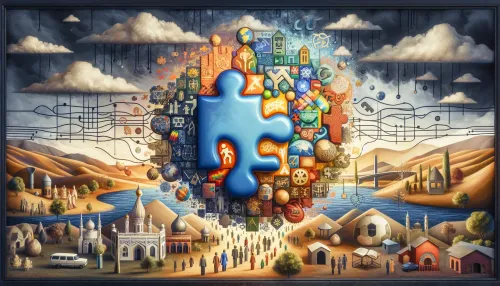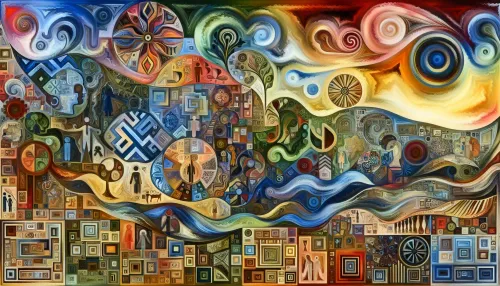Celebrating Diversity: Exploring the Impact of Cultural Heritage on Autism Understanding and Support

Autism is a complex neurodevelopmental condition that affects individuals worldwide, transcending cultural boundaries. The perception and support for autistic children vary greatly across diverse cultures, influenced by unique traditions, beliefs, and societal structures. In this article, we delve into the rich tapestry of cultural heritage and its profound impact on understanding and supporting autistic children. Let's embark on a journey that celebrates diversity while shedding light on the invaluable insights gleaned from different cultural perspectives.
Every culture weaves a distinct narrative around autism, shaping perceptions and fostering unique support systems. In some cultures, autism is viewed through a mystical lens, often associated with spiritual or supernatural explanations. Contrarily, modern Western societies approach autism from a clinical standpoint, emphasizing diagnostic categorization and therapeutic interventions.
Bridging Cultural Perspectives on Autism Support
This dichotomy underscores the need for a holistic understanding of autism that incorporates diverse cultural viewpoints. By acknowledging cultural variations in perceiving autism, we can bridge worlds, cultivate empathy, and foster inclusive support mechanisms that resonate with diverse communities.
Indigenous cultures possess centuries-old wisdom that transcends conventional knowledge. These rich traditions often harbor profound insights into nurturing autistic children, leveraging indigenous practices to harness their hidden strengths. Traditional healing methods, communal upbringing, and spiritual rituals embedded within indigenous knowledge systems can offer alternative avenues for supporting autistic children, complementing contemporary approaches with a deeper understanding of cultural nuances.
Indigenous Knowledge: Nurturing Autistic Children
By celebrating indigenous knowledge in autism care, we honor the resilience and resourcefulness of different cultures while amplifying the voices of marginalized communities within the broader discourse on autism support.
The fabric of family dynamics varies significantly across cultures, influencing the caregiving landscape for autistic children. In many cultures, extended family structures play a pivotal role in providing comprehensive support to autistic individuals. Grandparents, aunts, uncles, and cousins often contribute to caregiving responsibilities, fostering a network of holistic care that extends beyond immediate nuclear families.
Understanding the centrality of extended family ties in autism care empowers us to tailor support systems that align with diverse familial structures, promoting collaborative caregiving models anchored in cultural kinship traditions.
Related Article: Festive Spectrum: Adapting Cultural Festivals for the Inclusion of Autistic Children
Extended Family Structures in Autism Care
In multilingual societies, the intersection of language diversity and autism communication strategies presents a compelling tapestry of challenges and opportunities. Autistic children who grow up in multilingual environments navigate distinct linguistic landscapes, each carrying its own set of communication norms and nuances.
By unraveling the intricacies of language and expression in the context of autism across diverse linguistic backgrounds, we pave the way for culturally responsive communication interventions that honor linguistic diversity while optimizing supportive interactions for autistic children.
Communication Strategies for Autistic Children in Multilingual Settings
Cultural traditions encompass a spectrum of rituals and rhythms that hold profound therapeutic potential for autistic children. From rhythmic drumming ceremonies to traditional dance forms, many cultural practices intertwine sensory stimuli with communal participation, offering avenues for sensory integration and emotional expression tailored to the needs of autistic individuals.
Acknowledging the therapeutic value embedded within cultural traditions empowers us to incorporate culturally relevant interventions that resonate with autistic children, enriching their developmental journey through meaningful engagements with their cultural heritage.
Cultural Rituals and Their Therapeutic Benefits for Autism
The evolution of autism perception echoes the broader societal shifts witnessed across different cultures. In some cultures, autism was historically shrouded in misconceptions or stigmatization, relegating autistic individuals to the margins of society. Over time, advocacy efforts have paved the way for increased awareness, transforming erstwhile taboos into narratives of acceptance and inclusion.
By tracing this evolutionary trajectory, we gain invaluable insights into the strides made within diverse cultural contexts as they embrace neurodiversity and champion the rights of autistic individuals within their communities.
Communities serve as crucibles of collective wisdom, shaping autism interventions and influencing outcomes based on deeply ingrained beliefs. By examining community-specific beliefs surrounding autism, we unravel the intricate interplay between cultural norms, community support structures, and prevailing attitudes toward neurodiversity.
The Evolution of Autism Perception Across Cultures
Harnessing this collective wisdom empowers us to forge collaborative partnerships with communities, co-creating culturally sensitive intervention frameworks that align with community beliefs while nurturing an ethos of solidarity and inclusivity for autistic individuals.
Embracing neurodiversity necessitates drawing inspiration from cultures around the world that demonstrate a reverent embrace of diversity in all its forms. By highlighting exemplary practices from diverse cultural milieus that celebrate neurodiversity, we glean valuable lessons that transcend geographical boundaries, enriching our understanding of inclusive practices that honor the unique strengths inherent within every autistic individual.
Related Article: Amplifying Diverse Voices: Insights Across Cultures in Autism Care
Community Beliefs and Their Impact on Autism Interventions
Socioeconomic disparities exert pronounced influences on autism support mechanisms across global contexts. Access to resources, healthcare infrastructure, educational opportunities, and social welfare provisions varies widely among different societies. Recognizing these disparities prompts us to formulate nuanced strategies that address socioeconomic barriers while harnessing existing strengths within diverse socioeconomic landscapes to foster equitable support for autistic children worldwide.
Frequently Asked Questions
Diverse cultures perceive and support autism in unique ways, influenced by their traditions and beliefs. Some view it through spiritual lenses, while others adopt clinical approaches. Understanding these perspectives fosters empathy and inclusive support systems that resonate with various communities, bridging gaps between differing cultural viewpoints on autism.
Indigenous knowledge offers valuable insights into nurturing autistic children through traditional practices and communal upbringing. These methods often emphasize holistic care, utilizing spiritual rituals and community support to enhance the strengths of autistic individuals. Celebrating this wisdom can complement modern approaches, enriching the overall understanding of autism care.
Extended family structures are crucial in autism care as they provide a broader support network beyond immediate families. In many cultures, relatives like grandparents and aunts play significant roles in caregiving, fostering a collaborative environment that enhances the overall well-being of autistic individuals through shared responsibilities and cultural kinship.
Multilingual environments pose challenges for autistic children as they navigate different linguistic norms and communication strategies. Each language carries unique expressions and expectations, which can complicate interactions. Understanding these dynamics is essential for developing culturally responsive communication interventions that respect linguistic diversity while supporting effective interactions for autistic individuals.
Perceptions of autism have evolved significantly over time, with many cultures shifting from stigmatization to acceptance. Advocacy efforts have played a key role in transforming misconceptions into narratives of inclusion. This evolution highlights the importance of embracing neurodiversity and recognizing the rights of autistic individuals within various cultural contexts.
Check Out These Related Articles

Beyond Boundaries: Experiencing Autism Through a Multicultural Lens

Intersecting Identities: The Influence of Heritage on Autistic Children's Growth

Embracing Change Together: The Role of Religious and Spiritual Beliefs in Shaping Autism Acceptance
